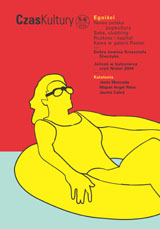Współczesna poezja katalońska. Krótka wyprawa w poszukiwaniu tradycji
Contemporary Catalan Poetry. A Short Quest for Tradition
Author(s): Xavier Farré VidalSubject(s): Literary Texts
Published by: Stowarzyszenie Czasu Kultury
Summary/Abstract: Catalan poetry (i.e. historic realism) vs. Franco’s dictatorship The gentle Catalan avant-garde Meta-poetry, historic materialism and the poetry of experience The poetry booms of the 1970’s The manifesto of young poets During the dictatorship of Franco the condition of Catalan poetry was extremely disturbed. The requirement to publish in Spanish was enough to weaken an area of art which was already limited to a select few. Catalan poetry was published illegally and the prohibited poetical meetings in bookshops usually ended as political disputes. It is interesting that during these times, the most popular poet was Carles Riba who represented the image of “a poet secluded in his ivory tower and alienated from what was going on around him”. It was not until after his death that a new poetical trend appeared. This was historic realism which gave the reader a feeling of a close bond with the poet. Symbolism and metaphysics were replaced with the new aesthetics of the ‘here and now’. It was this trend that introduced the poetry of the outstanding Miquel Marti i Pol who was later proclaimed the national poet. The tradition of Catalan poetry was too narrow to fully accommodate the revelling European avant-garde. Therefore, it was more inclined to make critical comments about the hitherto works instead of condemning them completely. This was excellently borne out by the leading poet of the times, J.V. Foix. The most important aspects of his poetry were “the irrational, daring images, loose associations that could provoke thoughts and a play on words” similarly to “the reworking of tradition from a completely fresh point of view and new ideas”. The works of Pere Gimferrer, which were to a certain extent inspired by avant-garde poetry which concurrently fostered post-symbolism and “opened the doors to meta-poetry” were composed in agreement with the literary movement which questioned historic realism, a trend that, at one time, thoughtlessly included Gabriel Ferrater. The successive trend, later referred to as ‘poetry of experience’, bore such poets as Francesco Parcerisas, the author of the renowned poem, The Golden Age (L’edat d’or), 1983, and Joan Margarit. By relating to the poetry of Ferrater and Joan Vinyola, who moved from an enchantment with post-symbolism to “a reflection on the transience and emptiness of the modern world”, Parcerisas and Margarit have created unique and distinguishable works which combine deliberation with cognisance and their cultural heritage. The 1970’s saw an outburst of poetical talent. One of the main representatives of the new movement was Maria Merce Marçal whose works focused on “love, sex and motherhood as well as the need to maintain a connection with her own self through another person. Her poetry also strongly referred to the works of Anne Sexton, Adrianne Rich, Anna Akhmatova and Marina Tsvetaeva.
Journal: Czas Kultury
- Issue Year: 2004
- Issue No: 05-06
- Page Range: 178-193
- Page Count: 16
- Language: Polish
- Content File-PDF

